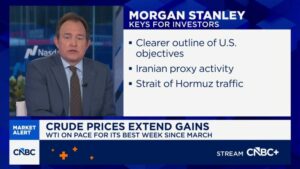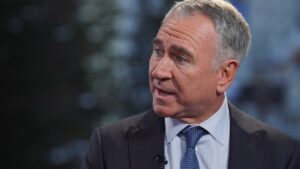A high dividend yield’s a double-edged sword — the potential gains are attractive but could be a sign of deeper issues.
Sinking cash into a failing company just for dividends can end in disaster. A declining share price can lead to dividends being cut and shareholders being left empty-handed. So it’s best to carefully assess a company’s prospects before getting too excited about the yield.
A struggling stock
One company I’ve had my eye on for some time is asset manager abrdn (LSE: ABDN). This 200-year-old company recently fell upon hard times. Before shortening its name and dropping its vowels, the company name was Standard Life Aberdeen, the result of an £11bn merger between Aberdeen Asset Management and Standard Life.
After several years of losses, the newly-merged company assigned a new CEO and shortened the name. It also began a three-year programme to cut costs and recoup losses.
But, so far, the results have been disappointing. abrdn reduced its dividends by a third in 2020 and has kept them stable since. In that time, the price has fallen 54%, leading to an inflated yield.
In 2022, the company bought the software platform Interactive Investor for £1.5bn. For a brief moment it looked promising, with the shares gaining 50% in Q4 2022.
But it didn’t last.
So where to from here?
There have been some small signs of improvement lately. The price is up 10% since this year’s low in April. In this year’s first-half results, earnings per share (EPS) exceeded analysts’ expectations, up to 9.2p from a 7.7p loss in H1 2023.
Revenue was down 8.7% but earnings increased by £316m. Overall, it was a good result compared to previous years.
But forecasts remain pessimistic. Earnings are expected to decline 45% in the coming 12 months, resulting in a forward price-to-earnings (P/E) ratio of 15.7. The industry average is currently 12.8, so the share price could struggle to push higher.
Still, the recent return to profitability’s a good sign. Considering that dividends were stable for three years, it seems less likely they would be cut now. That makes the current low price and high yield an attractive prospect.
But only if things keep improving.
Considering the bigger picture
abrdn’s not the only one struggling. Fellow asset manager Ashmore Group‘s down 61% in the past five years. Even major Prudential spin-off M&G‘s struggled to make any significant gains since 2020.
In a market commentary note in 2022, abrdn highlighted the Russia-Ukraine conflict and the Truss administration’s budget disaster as reasons for its struggles. Back then, recession fears were high but more recently, these have been downplayed.
The Ukraine conflict rages on but the economy’s improved somewhat since. The Bank of England enacted its first interest rate cuts earlier this year as inflation begun to subside. Then, last week, Prime Minister Starmer warned of potentially “painful” tax increases to be announced in the upcoming October budget.
Subsequently, business leaders’ confidence dropped.
That could slow abrdn’s progress. While I like the yield and the direction the company’s headed, I’ll wait until after the October budget announcement before deciding whether to buy.
This post was originally published on Motley Fool







